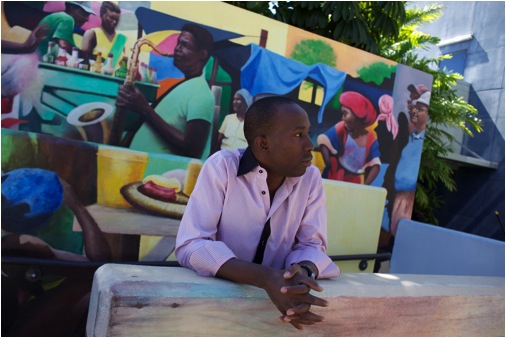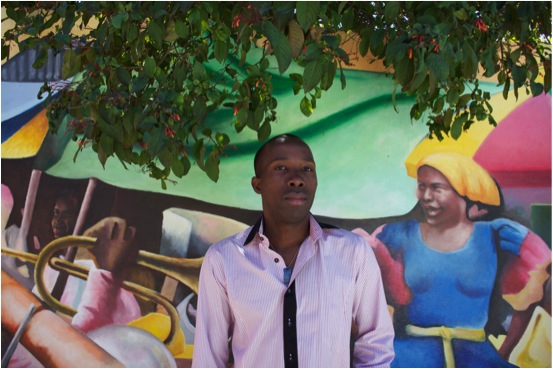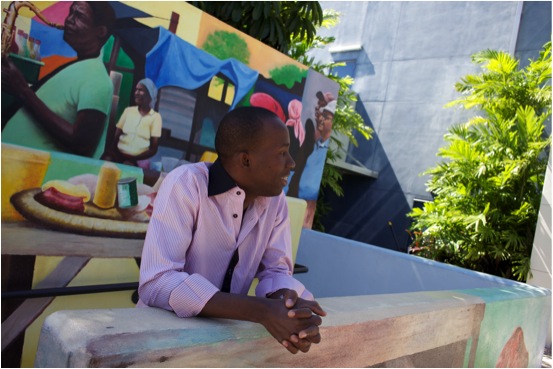By Alexander Britell (Photos: CJ)
Since his first album, Lakou Trankil, in 2005, Haitian singer Belo has seen his star soar, finding a global following for his mix of traditional Haitian, jazz and reggae styles. Belo, whose real name is Jean Belony Murat, is not only versatile musically — he also studied accounting for four years in university. His latest album, Haiti debout, which was released at the beginning of June, features a number of global guest musicians from France to Africa. It’s all part of a musical journey for the 32-year-old, who was in Miami Friday for a concert at the Little Haiti Cultural Center. Belo talked to Caribbean Journal about the new album, the significance of music in rebuilding Haiti and what President Michel Martelly’s pop-singer background means for his leadership.
What are you working on right now?
I’m promoting my latest album, titled Haiti debout, that just came out over the summer, so we’re still doing promotional tours in Haiti and all over the world.
How is the new album different from your previous work?
Well, it’s different in so many ways. We have more musicians from more different countries on it – there are musicians from Africa, from Paris, from Haiti, from [the US]. Second of all, the musical style is getting more international – since I know better what I want to do now. Of course, it’s different because I have two guests on this album that I didn’t have on the first two albums, two new singers with me.
How is the music becoming more international, more global?
Well, the concept of my music is to take the traditional Haitian music and put other styles of music, modern styles in it. So the more you have musicians from different horizons, the more you have music that is open to the world. I think that helps give it this international style that I want for my music.
What have you seen in terms of progress in Haiti since the earthquake?
Well, what I can say is that the Haitian people are courageous – they didn’t really wait for the NGOs or the government to start rebuilding. So they did their own efforts to give life to the country, especially in Port-au-Prince. In terms of reconstruction, of governmental reconstruction, nothing has been done yet, really, but every person’s actions have made a big difference. So if you go to Haiti now, the situation is different from what it was a year and a half ago.
What role can music play in helping to rebuild Haiti?
Not only for the rebuilding – I think that music played a big role just keeping the nation up after the earthquake. So the population had nothing else to do but listen to music, and stay together. So music is in our lives, and we can do everything with music in Haiti. I think we still have work to do in terms of giving hope to the people, which is very important.
Obviously President Michel Martelly is a singer. What does that mean for his leadership – what do you think about a fellow singer running country?
I think that I am a father, and I’m a singer. I’m an accountant, and I’m a singer – it’s two different people. When I’m the father, I’m the father, and when I’m the musician, I’m the musician. So President Martelly is a musician, and a president who happens to be a musician. Right now I think he’s more of a president than a musician. Of course, his popularity gives him the ability to lead the people, to lead the nation, because he’s used to that – it’s not new for him, to lead a crowd. But there’s nothing to do with music besides that.
How is your music growing, and how will it continue to develop?
[It will] as long as I keep giving a good message with my music, with the new generation, the children. think they need a model, a line to follow. That’s why I keep doing social conscience music, because we really need that in Haiti – we need music for peace and unity. Of course, before me, some singers did that, but if you did that in the 1980s, I would have enjoyed it [at the time], but the new generation doesn’t listen to music from the 80s. So we have to keep promoting tolerance, keep promoting peace and education.


